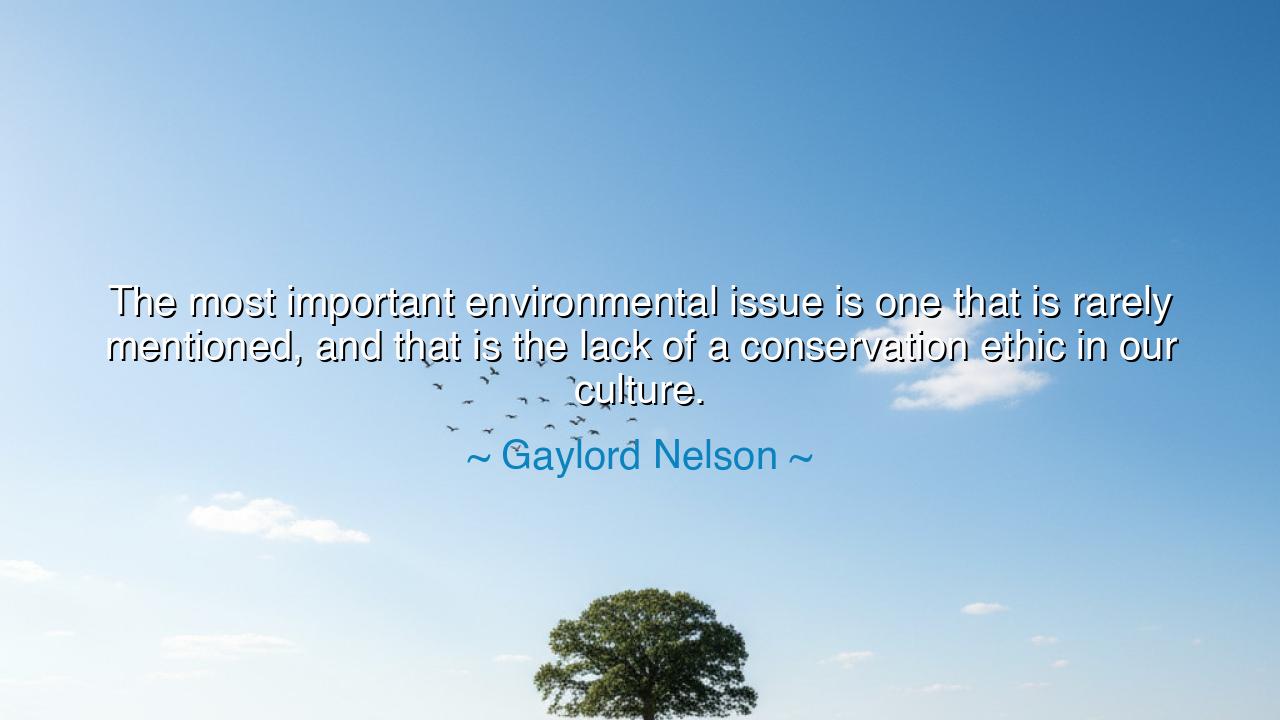
The most important environmental issue is one that is rarely
The most important environmental issue is one that is rarely mentioned, and that is the lack of a conservation ethic in our culture.






When Gaylord Nelson, founder of Earth Day, declared, “The most important environmental issue is one that is rarely mentioned, and that is the lack of a conservation ethic in our culture,” he was not merely speaking of pollution, deforestation, or climate change. He was reaching deeper — into the soul of humanity itself. His words are not a warning about technology or industry, but a lament about values, about the forgotten relationship between humankind and the Earth that birthed it. For Nelson understood that the crisis of the environment is not born from ignorance alone, but from indifference, from a heart that no longer feels reverence for the natural world.
The origin of this quote lies in Nelson’s lifelong devotion to awakening the moral conscience of a generation. As a senator and environmental visionary, he witnessed the rising tide of industrial expansion in postwar America — rivers poisoned by waste, forests vanishing beneath machines, skies dimmed by smoke. Yet what troubled him most was not the pollution itself, but the spiritual decay that allowed it. People had ceased to see the Earth as sacred; they saw it as a resource to be conquered, consumed, and discarded. In this loss of reverence — this absence of what he called a “conservation ethic” — Nelson saw the true root of the environmental crisis. For without an inner code of respect for the planet, no law, technology, or policy could ever truly save it.
To the ancients, this idea would have been understood as the breaking of a covenant between humankind and the divine order. The Greeks called it hubris — the arrogance of mortals who believed themselves above the laws of nature. The Native American tribes, too, taught that the Earth is a living being, and that every act against her carries a spiritual cost. The ancients did not speak of “sustainability” as we do now, but they practiced it instinctively, for they saw themselves not as masters of the world but as stewards of a gift. Nelson’s lament is that modern civilization, in its quest for power and wealth, has forgotten this sacred duty. The rivers have become mirrors reflecting our greed; the forests, witnesses to our forgetfulness.
Consider the story of Easter Island, once a thriving civilization surrounded by towering palm forests. The islanders, desiring more monuments and greater splendor, felled every tree for their ambitions. In time, the forests vanished, the soil eroded, the birds disappeared — and with them, the people’s own survival. Their downfall was not ignorance of ecology; it was a failure of ethics, of restraint, of humility. So too, Nelson warns, modern humanity risks becoming the new Easter Island — intelligent, creative, and doomed by its lack of reverence. The lesson is timeless: when we forget that we belong to the Earth, the Earth will remind us — through silence, through famine, through the collapse of the systems that sustain us.
But Nelson’s words are not words of despair; they are a call to awakening. For if the disease is spiritual, so too must be the cure. To restore the planet, we must first restore the human heart. The conservation ethic he spoke of is not merely a philosophy for scientists or activists — it is a way of living for all people. It begins in the smallest acts: in gratitude for water, in respect for soil, in awareness of the cost of every comfort we enjoy. It is the realization that every choice — every meal, every purchase, every light left burning — is a conversation with the Earth.
Nelson’s vision reminds us that environmentalism must rise beyond politics and become a cultural and moral revival. For laws can restrain pollution, but only ethics can transform behavior. A civilization that cherishes the Earth will need fewer regulations, for its people will act not out of fear, but out of love. The “conservation ethic” is thus the rebirth of something ancient — a return to wisdom that once flowed naturally through human life, when we lived in rhythm with the seasons, when reverence for nature was as instinctive as breathing.
The lesson, then, is clear and eternal: protecting the Earth begins with remembering who we are. We are not conquerors of nature but her children, shaped from her dust and destined to return to her embrace. Let us rekindle the ethic that Nelson spoke of — let us teach our children not only how to consume, but how to cherish. Let us speak again to the rivers, to the forests, to the winds, not as strangers but as kin. For only when we rediscover the moral bond between humanity and the Earth will we have truly addressed the most important environmental issue of all.
And so, my children, let this wisdom guide you: build within yourselves a conservation ethic — not of duty alone, but of devotion. Let every act be a prayer of gratitude to the planet that feeds and shelters you. For the salvation of the Earth does not begin in the laboratories of science or the halls of power; it begins in the quiet chambers of the human heart — where reverence is remembered, and love for creation is restored.






AAdministratorAdministrator
Welcome, honored guests. Please leave a comment, we will respond soon